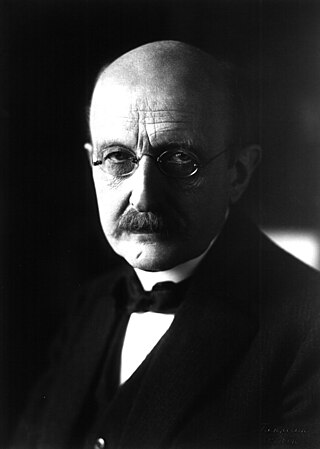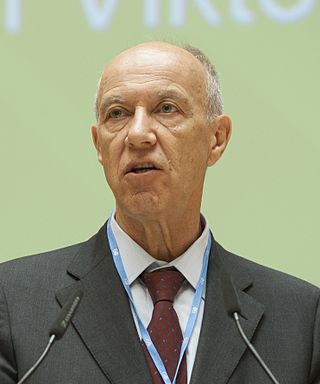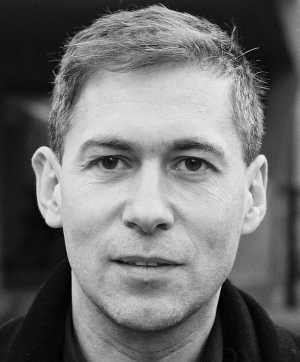Joseph Straus (born 1938 in Trieste, Italy) [1] is professor of intellectual property law, former director of the Max Planck Institute for Intellectual Property, Competition and Tax Law, Munich, Germany, [1] and Chairman of the Managing Board of the Munich Intellectual Property Law Center (MIPLC). According to the Intellectual Asset Management magazine, he is "one of the world's most influential patent scholars." [2] He is member and dean of the Class "Social Sciences, Law and Economics" of the European Academy of Sciences and Arts. [1]

Max Karl Ernst Ludwig Planck was a German theoretical physicist whose discovery of energy quanta won him the Nobel Prize in Physics in 1918.
The draft European Patent Litigation Agreement (EPLA), or formally the Draft Agreement on the establishment of a European patent litigation system, was a proposed patent law agreement aimed at creating an "optional protocol to the European Patent Convention (EPC) which would commit its signatory states to an integrated judicial system, including uniform rules of procedure and a common appeal court". It differed from the Unified Patent Court Agreement in that the EPLA negotiations were coordinated from the side of the European Patent Office, rather than from the European Council and Commission and therefore also offered the possibility for non-EU states to participate.
The International Review of Intellectual Property and Competition Law is a peer-reviewed academic journal published by Springer Science+Business Media on behalf of the Max Planck Institute for Innovation and Competition. It was established in 1970 and covers worldwide developments in intellectual property and competition law. In addition, the journal also covers decisions and leading cases from jurisdictions around the world, as well as editorials, opinions, reports, case notes, and book reviews. The editors-in-chief are Reto M. Hilty and Josef Drexl.
GRUR International - Journal of European and International IP Law is a monthly journal co-published in English by Verlag C.H. Beck and Oxford University Press. Founded in 1952 and owned by the German Association for the Protection of Intellectual Property (GRUR), since 1967 the Max Planck Institute for Innovation and Competition has assumed the scientific direction of the journal. Originally published in the German language, GRUR International made the transition to English in 2020.

The Max Planck Institute for Innovation and Competition is a Munich, Germany, based research institute, which is part of the Max Planck Society for the Advancement of Science, which manages 84 institutes and research institutions. The institute was formerly known as the Max Planck Institute for Intellectual Property and Competition Law and the name was changed to Max Planck Institute for Innovation and Competition in view of the broader focus of the institute and its interdisciplinary character. The major research areas of the institute are intellectual property, innovation and competition. Apart from providing research support for scholars from across the world, the institute also publishes the International Review of Intellectual Property and Competition Law (IIC).
Sir Nicholas Richard Pumfrey styled The Rt Hon. Lord Justice Pumfrey, was a British barrister. He served as a High Court judge for 10 years, and was promoted to the Court of Appeal little more than a month before his sudden death.

Francis Gurry is an Australian national, who was from 2008 to 2020 the fourth Director General of the World Intellectual Property Organization (WIPO). During that time, he was also Secretary-General of the International Union for the Protection of New Varieties of Plants (UPOV). Gurry also served as a Deputy Director General of WIPO from 2003 to 2008.
The Munich Intellectual Property Law Center (MIPLC) is a center for both research and education in intellectual property and competition law, founded in 2003 and based in Munich, Germany. The MIPLC is a project of the George Washington University Law School and three German institutions: the Max Planck Institute for Innovation and Competition, the University of Augsburg, and the Technical University of Munich (TUM). It offers the English-language LL.M. program "Intellectual Property and Competition Law."
The Max Planck Institute of Psychiatry is a scientific institute based in the city of Munich in Germany specializing in psychiatry. Currently directed by Elisabeth Binder and Alon Chen, it is one of the 81 institutes in the Max Planck Society.
Intellectual property organizations are organizations that are focused on copyrights, trademarks, patents, or other intellectual property law concepts. This includes international intergovernmental organizations that foster governmental cooperation in the area of copyrights, trademarks and patents, as well as non-governmental, non-profit organizations, lobbying organizations, think tanks, notable committees, and professional associations.
Cornelia Rudloff-Schäffer is the current president of the Deutsches Patent- und Markenamt (DPMA), a post she has held since 1 January 2009. She studied law, politics and media studies and was, after the second legal civil service examination, employed as academic employee at the Max Planck Institute for Foreign and International Patent, Copyright and Competition Law and at the Institut for the Protection of Industrial Property at the Ludwig Maximilian University of Munich.
John R. "Jay" Thomas is a professor of law at Georgetown University Law Center.

Kai A. Konrad is a German economist with his main research interest in public economics.

Robert Klaus Freiherr von Weizsäcker is a German economist and honorary president of the German Chess Federation. He has held the Chair of Economics, Public Finance and Industrial Organization at Technical University of Munich. He is the eldest son of the late former German President Richard von Weizsäcker (1920–2015).

Paul Goldstein is a law professor at Stanford Law School.
The Max Planck Institute for Tax Law and Public Finance is an interdisciplinary research center in Munich. The Institute is part of the Max Planck Society, Germany’s foremost provider of basic research in science and humanities, funded largely from public resources.

Wolfgang Fikentscher was a German jurist and legal anthropologist.
Dennis S. Karjala was an American intellectual property law professor at Arizona State University. His major interests in teaching and research were primarily in the area of intellectual property, specifically in copyright and its applications in digital technologies. His work in the field of intellectual property was internationally recognized and complemented by his ease in speaking and writing in Japanese.
Gerhard Schricker was a German legal scholar with a focus on intellectual property and competition law. He was a full professor at Ludwig Maximilian University of Munich from 1973 to 2000 and served as Director of the Munich-based Max Planck Institute for Foreign and International Patent, Trademark, and Copyright Law between 1971 and 2003.